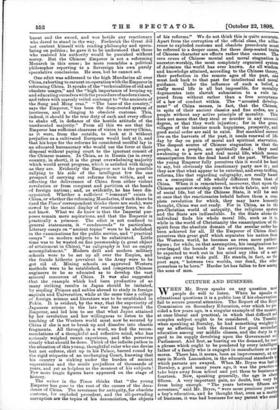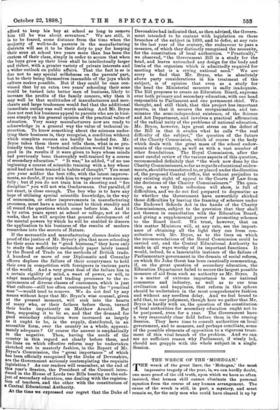CULTURE AND BUSINESS.
WHEN Mr. Bryce speaks on any question most people do well to listen. When he speaks on educational questions it is a public loss if his observations fail to secure general attention. The Report of the Royal Commission on Secondary Education, over which he pre sided a few years ago, is a singular example of the manner, at once liberal and practical, in which that difficult and complex subject ought to be considered. On Tuesday. when speaking at Burnley, he had something weighty to say as affecting both the demand for good secondary education among our middle classes, and the duty in re- gard to its supply devolving upon the Government and Parliament. And first, as bearing on the demand, he usei a phrase which ought to be pondered by every intelligent father of a family who is engaged in manufacture or com. merce. There has, it seems, been an improvement, at any rate in North Lancashire, in the educational standards by which parents are swayed. When Mr. Bryce was last 1. Burnley, a good many years ago, it was the practice t4 take boys away from school and put them to business at fourteen. Now, speaking generally, the age is abou fifteen. A very important gain, no doubt, but very f from being enough. "The years between fifteen au seventeen," said Mr. Bryce, "were most precious years a boy's education, and he thought that, even as a matte of business, it was bad business for any parent who coal afford to keep his boy at school so long to remove him till be was about seventeen." We are still, it is to be feared, some distance from the time when the majority of well-to-do parents in the manufacturing districts will see it to be their duty to pay for keeping their sons at school two years more than has been the custom of their class, simply in order to secure that when the boys grow up their lives shall be intellectually larger and richer, with a greater variety of private interests and a wider outlook on public affairs. That the fact is so is due not to any special selfishness on the parents' part, but to their being themselves insensible of the joys which culture makes possible. But if they could be once con- vinced that by an extra two years' schooling their sons would be turned into better men of business, likely to increase the profits of the family concern, why then it may well be that multitudes of manufacturers and mer- chants and large tradesmen would feel that the additional immediate outlay was well worth making. And Mr. Bryce does not rest his business appeal to parents who are in busi- ness simply on his general opinion of the practical value of education. Very many manufacturers now are ready to acknowledge in a general way the value of technical in- struction. To know something about the sciences under- lying their business is, they recognise, a condition without which complete success can hardly be looked for. Mr. Bryce takes them there and tells them, what is so pro- foundly true, that "technical education would be twice as good in its results if it were given to boys whose minds had previously been thoroughly well-trained by a course of secondary education." "It was," he added, "of no use beginning a course of scientific training with a boy whose mind had not been trained in habits of thought." You must give your soldier the best rifle, with the latest improve- ments, no doubt, if you wish him to wage your wars success- fully ; but if you do not train him in shooting and "fire discipline" you will not win Omdurmans. Our parallel, if not exact, is close enough. The boy who is to have any hope of utilising special scientific knowledge, in the way of economies, or other improvements in manufacturing processes, must have a mind trained to think steadily and all round the questions which come before him. And it is by extra years spent at school or college, not at the works, that he will acquire that general development of the mental powers by which he will be enabled to discern the application to his business of the results of modern researches into the secrets of Nature.
If the mercantile and manufacturing classes desire any proof of the justice of Mr. Bryce's plea that more schooling for their sons would be "good business," they have only to study the sufficiently melancholy paper lately issued by the Board of Trade on the methods of British trade. A hundred or more of our Diplomatic and Consular officers deplore the failure of their countrymen to hold their own in competition with foreigners in various parts of the world. And a very great deal of the failure lies in a certain rigidity of mind, a want of power, or will, to adapt manufacturing and trading processes to the re- quirements of diverse classes of customers, which is just what culture—still too often contemned by the "practical man "—would tend to remove. We do not feel by any means without hope that Mr. Bryce's wise counsel, given at the present moment, will sink into the hearts of many who, or their fathers before them, turned their backs impatiently on Matthew Arnold. But then, supposing it to be so, and that the demand for good secondary education were increased as largely as it ought to be, is the supply, distributed, in an accessible form, over the country as a whole, approxi- ately adequate ? Of course the answer is emphatically in the negative. Then, having the needs of the country in this regard set clearly before them, and the lines on which effective reform may be undertaken sketched out in masterly fashion, in the Report of Mr. Bryce's Commission, the "great importance" of which has been officially recognised by the Duke of Devonshire, are the Government seriously contemplating the requisite legislation ? As our readers will remember, at the end of this year's Session, the President of the Council intro- duced in the House of Lords two Bills bearing on the sub- jec. t of secondary education, one dealing with the registra- tion of teachers, and the other with the constitution of a Central Educational Authority. At the time we expressed our regret that the Duke of Devonshire had indicated that, as then advised, the Govern- ment intended to be content with legislation on these branches of the subject in 1899, and to defer, at any rate to the last year of the century, the endeavour to pass a measure, of which they distinctly recognised the necessity, for the constitution of local authorities. "Practically," we observed, "the Government Bill is a study for the head, and leaves untouched any design for the body and limbs of the organism which is admittedly required for meeting what is a crying national need." We are- sorry to find that Mr. Bryce, who is absolutely- above party considerations in his treatment of the- subject, is of opinion that even as a study for- the head the Ministerial measure is sadly inadequate. The Bill proposes to create an Education Board, supreme over both primary and secondary education, with one head responsible to Parliament and one permanent chief. We thought, and still think, that this project has important merits, in that it secures the reorganisation, and ter- minates the semi-independent existence, of the Science and Art Department, and involves a practical affirmation of the radical unity of the problems of national education.
Mr. Bryce, however, lays great stress on the defect of the Bill in that it evades what he calls "the real difficulty of the subject," the question of the future of the Charity Commission, which of course is the body which deals with the great mass of the school endow- ments of the country, as well as with a vast number of other foundations. The Royal Commission, after the most careful review of the various aspects of this question, recommended definitely that "the work now done by the Charity Commissioners, so far as regards educational endow- ments, should betransferred to, or placed under the direction of, the proposed Central Office, but without prejudice to any existing right of appeal to the Courts of Law from the decisions of the Charity Commissioners." The ques- tion, as a very little reflection will show, is full of difficulties, and we do not feel prepared to dogmatise as to whether the Government have unworthily shirked' those difficulties by leaving the framing of schemes under the Endowel. Schools Act in the hands of the Charity Commissioners, subject to the provision that they shall act thereon in consultation with the Education Board, and giving a supplemental power of promoting schemes to the Board itself. We trust, however, that on this matter Ministers will, at any rate, see the import- ance of obtaining all the light they can from con- sultation with Mr. Bryce, as to the lines on which the recommendations of the Royal Commission could be carried out, and the Central Educational Authority be made in all ways worthy of its important functions. It would, indeed, be a lamentable instance of the failure of Parliamentary government in the domain of social reform, on which Sir John Gorst has been caustically commenting, if, on the great question of secondary education, the Education Department failed to secure the largest possible measure of aid from such an authority as Mr. Bryce. It is a matter of extreme importance to our national commerce and industry, as well as to our true civilisation and happiness, that reform in this sphere should be undertaken in the most comprehensive fashion and without any needless delay. And we feel bound to add that, in our judgment, though here we gather that Mr. Bryce is hardly with us, the question of the constitution of local authorities for secondary education ought not to be postponed, even for a year. The Government have - a very reasonably clear field before them in the coming Session. They have time to consult authorities on local; government, and to measure, and perhaps conciliate, some of the possible elements of opposition to a vigorous treat:- ment of this vital branch of the problem. And we can see no sufficient reason why Parliament, if wisely leer,. should not grapple with the whole subject in a singlo- Session.











































 Previous page
Previous page